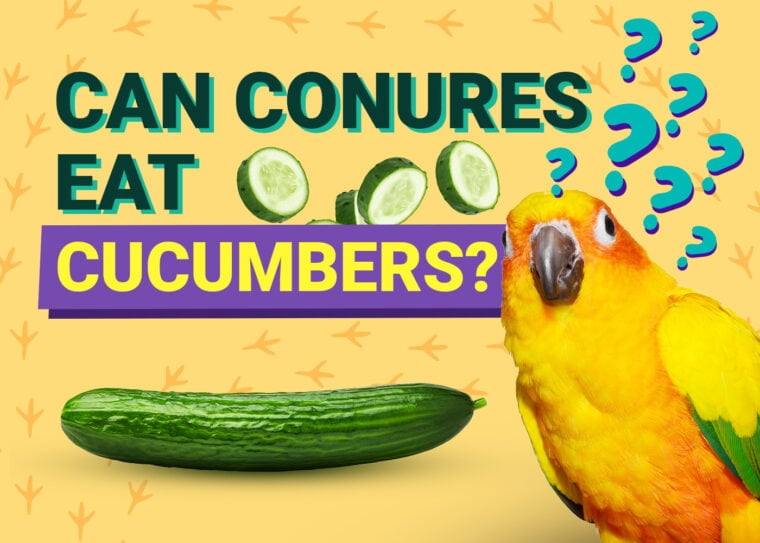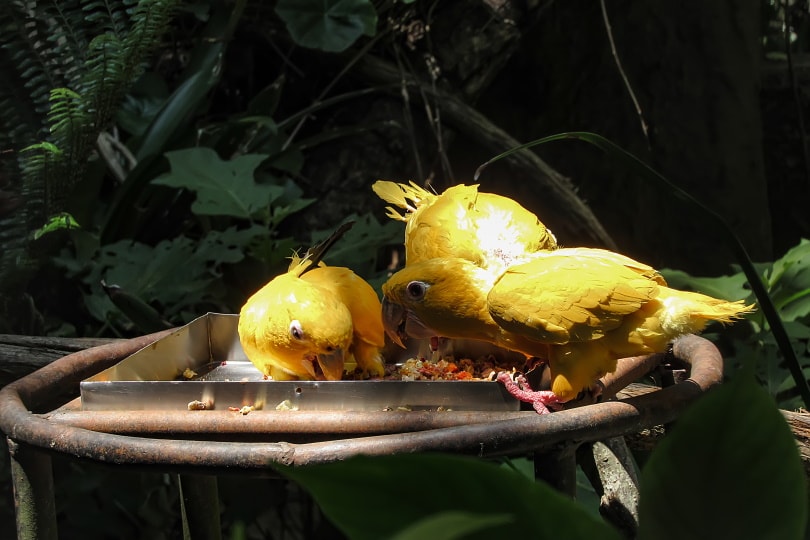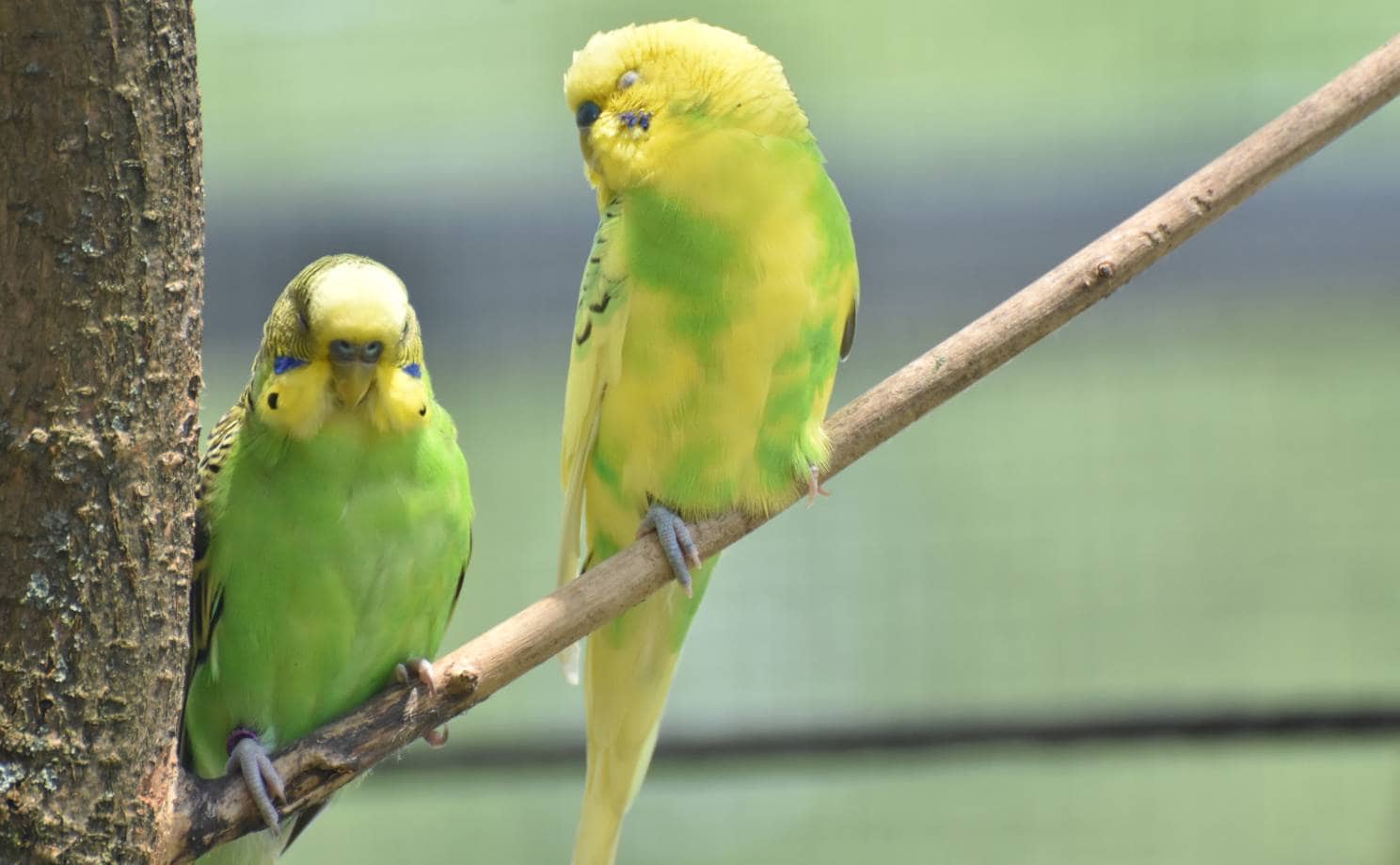
If you’re at the store or the fridge trying to figure out what to slice up for your conure, it can seem like there are a million options. The good news is that your conure can eat just about any vegetable, including cucumbers.
But some vegetables are better for your conure than others, so which ones should you choose? We highlight everything that you need to know here.
Can Conures Eat Cucumbers?
Yes! Not only is feeding cucumbers to your conure an affordable option, but cucumbers also have a litany of health benefits. In short, there are few foods better for your pet bird than this green fruit!
We recommend feeding chopped-up cucumbers daily as a part of their regular diet.
The 3 Benefits of Cucumbers for Conures

Cucumbers are natural and healthy foods for you to add to your conure’s diet. They don’t have a high amount of sugar or other harmful products. But equally important is what it does have.
We highlighted the three most beneficial nutrients in cucumbers here.
1. Water
Just like you need water in your diet to stay healthy, your bird also needs copious amounts of water. While they can get some of it from their water dish, it’s easier and more helpful for them to get it from their food.
Considering that a cucumber is 96% water, every time they eat one, it’s almost like they’re getting a drink of water from their dish.
2. Beta-Carotene
Beta-carotene is an extremely beneficial part of various foods. Parrots (and humans) break beta-carotene down into vitamin A, and vitamin A does quite a bit for their bodies.
3. Vitamin A
Vitamin A supports your parrot’s immune system, eye health, and digestive system. It is an integral part of your parrot’s health, and feeding them cucumbers is an excellent way for them to get enough.
The 5 Other Great Vegetables for Your Conure
Cucumbers are great for your conure, but they’re not the only vegetables that your bird should be eating. Just like vegetables are good for your health, they’re excellent for your conure too. Here, we highlighted a few of the best veggies that you can feed your bird.
1. Collard Greens
Dark leafy greens are great for your conure, and collard greens are filled with vitamin K. This helps parrots absorb calcium, which gives them healthy and strong bones. Since bone quality is one of the most common health concerns in domesticated parrots, they need ample amounts of vitamin K.
2. Squash
Squash comes loaded with vitamin C, which helps promote overall eye health, so your parrot doesn’t have to deal with problems like cataracts and macular degeneration.

3. Carrots
Carrots have four nutrients to keep your conure healthy. First and foremost are vitamin A and beta-carotene. They also have calcium and vitamin K, which help with bone health. This is something that your conure needs help getting.
4. Broccoli
Iron, potassium, calcium, magnesium, vitamins A, C, E, and K, folic acid, and B vitamins are all in broccoli. It’s almost a superfood, and it’s something that you want to load up in your conure’s food dish.
5. Peas
Peas are extremely healthy options for your conure. They have vitamins A, B, C, and E, zinc, and tons of antioxidants that can work to help keep your conure happy and healthy.
Stick to the Pellets
Trying to meet all the individual requirements of your conure’s diet is a complicated endeavor if you’re tracking down all the foods individually. That’s why it’s crucial to stick to a pellet-based diet that has everything that your parrot needs to stay healthy.
Choose a high-quality pellet food, and it should make up 75–80% of your parrot’s diet. From there, you can supplement with vegetables and fruit while mixing in the occasional seeds as treats. Don’t be stubborn and think that you can navigate it all. Stick with what works.

The 4 Foods to Avoid Feeding Your Conure
While there are plenty of foods that are great for conures, there are a few that you need to keep away from your bird. We highlighted four of them here.
1. Salt
You might think that you’re doing your conure a favor by adding a little flavor to their food, but don’t do it. Small amounts of salt can have significant ramifications on your conure. Even the salt content on a single potato chip can be enough to possibly kill your bird.
2. Avocado
Conures love fruits and veggies, so it might seem natural to give them avocado. However, just about every part of an avocado is toxic for your bird, so keep these fruits as far away as possible.
3. Chocolate
Birds seem to love chocolate. The problem is that chocolate doesn’t love them back. Chocolate leads to vomiting, diarrhea, seizures, and death. The momentary pleasure that your parrot gets from eating chocolate isn’t worth it.
4. Apple Seeds
While your parrot will devour different foods, including apples, apple seeds contain arsenic. It’s a small enough amount that it won’t hurt you, but for a much smaller bird, it can kill them. Always remove the seeds before giving your conure an apple.
Final Thoughts
In the end, it’s giving your conure a varied diet that matters. Conures love fruits and veggies, cucumbers included. While a pellet-based diet will provide them with all the nutrients that they need, fruits and veggies are ideal for keeping your parrot happy and healthy while giving them an extra boost of nutrients.
Variety is vital, though, because while many of these veggies are good for them, they need the nutrients from all of them to stay happy and healthy!
- Here’s something to ponder: Can Conures Eat Apples? What You Need to Know!
Featured Image Credit: Lucas Correa Pacheco, Shutterstock








